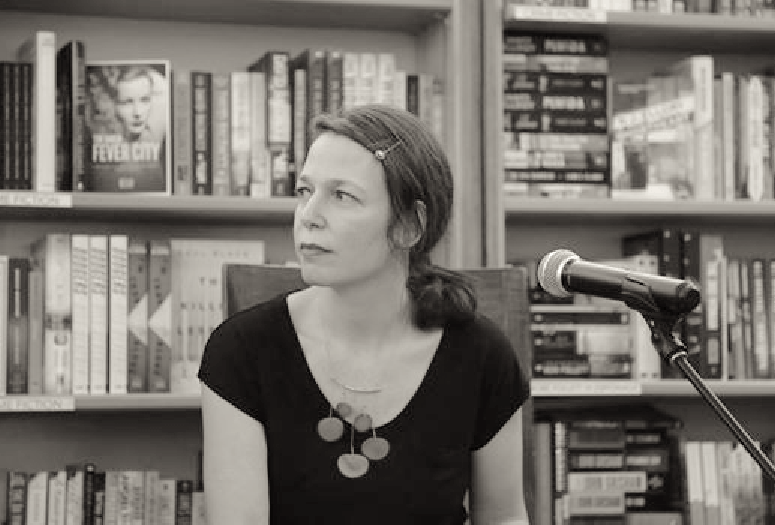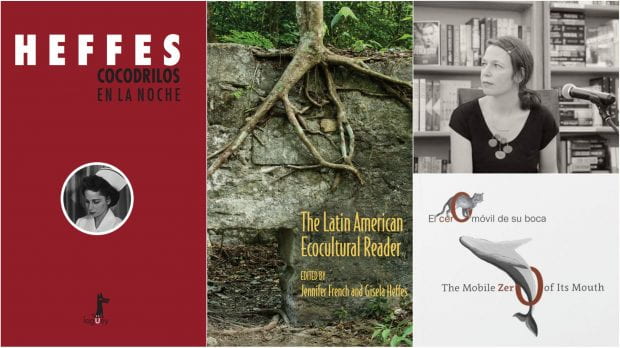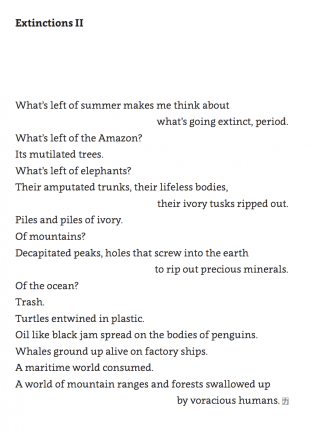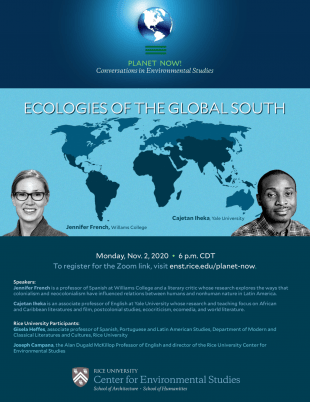Many people are lucky to publish even one book a year, let alone during a pandemic. Gisela Heffes, associate professor of Latin American literature and culture, has three books coming out this fall across three distinct genres.
Two publications are the culmination of five years’ worth of work, while the third — a book of poetry — was an unexpected bonus.
“The Latin American Ecocultural Reader” is a collection of seminal Latin American pieces on the environment — from poetry and prose, to essays, memoirs, biographies and acceptance discourses such as that of assassinated Honduran environmental activist Berta Cáceres — each with a critical introduction explaining its salience. Many are being presented in English for the first time.
“Cocodrilos en la noche” (“Crocodiles in the Night”) is a semi-autobiographical novel documenting the agony and death of her father mostly from afar, her family in Argentina keeping her posted on the progress of his pancreatic cancer via WhatsApp.
And “El cero móvil de su boca” (“The Mobile Zero of Its Mouth”) is a short book of poetry capturing the fleeting beauty of summer, inspired by a family vacation to Montreal in which Heffes began to ponder what will be left of the Earth one day soon: “I think about children who’ll grow up to study a virtual world. / Children who’ll only see glaciers as internet images. / Who’ll learn that polar bears dug through trash. / And that confused salmon floated in nonsensical currents.”
Although she has produced several novels, a novella and a collection of short stories in addition to her academic work and monographs, this is Heffes’ first volume of poetry.
Heffes, who writes primarily in Spanish, only meant to share the poems with her English-language translator, but the translator enjoyed them so much he contacted an editor on her behalf. The editor, based in Mexico City and Miami, wanted to publish the poems in both Spanish and English.
“That was not expected — I wasn't expecting to have three books in the same year,” said Heffes, who herself is the founder of a digital repository that gathers the voices of Spanish American writers living in the United States. “But it happened, and I'm very happy and I am very excited.”
As well as serving on two dissertation committees this year at the University of Texas and Tulane University, Heffes is teaching two courses at Rice this fall: Environmental Justice and Disabled Bodies: Illness and Literature in Latin America. Both courses typify the intersections of her work and research.
In “Cocodrilos en la noche,” Heffes contemplates the medical necessity of the painful procedures her father endured in Buenos Aires before he passed away in 2015. He never recovered from the oncological surgery he went through and remained in the hospital for over a month as he slowly transformed into “another person,” Heffes said.
“Something that really struck me was the ruthlessness of the doctors,” she said. Perhaps it would have been better to provide her father palliative care rather than “have him going through what, in my view, was a slaughter. They were like butchers.”
The novel is an intimate means of processing her grief and paying homage to her father, she said, but it resonates for anyone dealing with grief from afar amid a worldwide pandemic.
“It also addresses what it is like to have a father that is dying when one is in exile like me,” Heffes said. “The first part of the novel takes place in Buenos Aires but then I'm back in Houston and I have to deal with the world, and I have to go and teach, and I have my family and I have my kids; the only way I’m finding out what is going on is through this little device — using WhatsApp in my bathroom at 3 o’clock in the morning, trying to not wake anyone up since there is school and work the next day.”
As with “Cocodrilos en la noche,” five years of work also went into “The Latin American Ecocultural Reader,” which she co-edited with Williams College professor Jennifer French. The two have long worked together in the area of ecocriticism, and always noted the need for more Latin American voices on the topic.
The two proposed a book that would open the door to more conversation in the context of Latin American studies. What they wanted to create, she said, was “something that would give a more theoretical and methodological approach to Latin American environmental studies in the context of literature and culture.”
The anthologized texts Heffes and French selected are arranged in chronological order, spanning from the early colonial period to the present, tracing the historical development of Latin American environmental thought and arguing that the multiple characteristics evident today — from Amerindian ontologies to ecofeminism, popular-national telluric imaginings and syncretic Afro-Latin cultural practices, among others — all have genealogies that can be traced together in tandem with the continuities and ruptures that have accompanied political, economic and technological transformations in Latin America.
The “Reader” marks the first time that important essays by writers such as José María Heredia y Heredia, José María Samper, Baldomero Lillo and Ramón Amaya Amador, among others, have been translated into English — no small task, Heffes said, but a vital step in broadening the discussion about environmental degradation, thought, aesthetics, epistemologies, and, of course, justice, which know no cultural or linguistic boundaries.
Nov. 2 at 6 p.m., Heffes and French will discuss the “Ecologies of the Global South” in a webinar that's part of the ongoing Planet Now! series organized by Rice’s Center for Environmental Studies (CES). They’ll be joined by Cajetan Iheka, associate professor of English at Yale University, and Joseph Campana, the Alan Dugald McKillop Professor of English and director of the CES.
In this webinar, they’ll discuss literature and culture from Africa as well as topics ranging from resource extraction to the ongoing killings of environmental activists in the global south; death tolls have doubled over the past 15 years to levels usually associated with war zones.
Heffes will pair up with Campana again Nov. 16 for the final Planet Now! event: a faculty spotlight on political ecologist Sophie Sapp Moore, a postdoctoral fellow who will be joining Rice’s Diluvial Houston project in January 2021, and Jacqueline Couti, the Laurence H. Favrot associate professor in modern and classical literatures and cultures.
It’s a busy year, but Heffes knows that whenever she needs a respite she can always turn to her favorite hobby: writing.
“At least for me, writing is something that comes naturally, and I really enjoy it — like these precious moments,” she said. “When I was in Montreal and I was working, for my downtime I would take a cup of tea and just write about, say, this little cat that always came to visit.”
And that, perhaps, is how you publish three books in a year.




